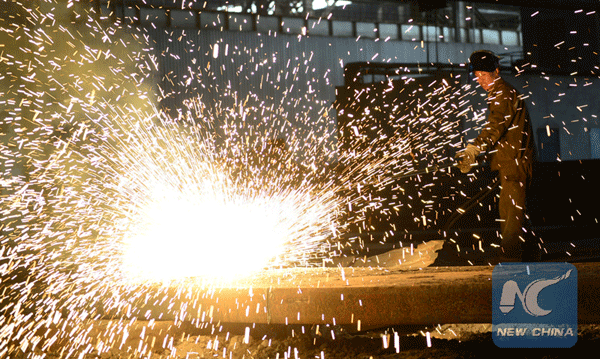 |
|
A factory worker is making steel. [Photo/Xinhua] |
Amidst unmistakable signs of China’s economic slowdown, some Western observers begin to wonder if China’s doomsday is coming.
"The country’s extraordinary economic difficulties will result in a collapse or a long-term decline, and either outcome suggests China will return to the ranks of weak states," wrote Gordon Chang in a December 2015 National Interest commentary. Then in a January 2016 Foreign Affairs article, Daniel Lynch, a professor at the University of Southern California, argued that China’s rise is ending, though he made it clear that "saying China’s rise is ending is not the same as saying the country will collapse."
It is too early to pass judgment on this new round of China prophecy, but history offers us some useful clues. Gordon Chang published The Coming Collapse of China in 2001. "The end of the modern Chinese state is near," he asserted. "The People’s Republic has five years, perhaps ten, before it falls." China didn’t collapse in 2006 or 2011. "So, yes, my prediction was wrong," he admitted in a Foreign Policy article ("The Coming Collapse of China: 2012 Edition"). But he remained convinced about the imminence of a Chinese apocalypse and offered a new timeline: "Instead of 2011, the mighty Communist Party of China will fall in 2012. Bet on it."
Why do people like Gordon Chang keep predicting the coming collapse of China? For many observers, a wealthy and powerful China represents the biggest threat to Western liberal democracy. It is a zero-sum game: either China wins, or liberal democracy triumphs. China thus becomes the most important roadblock in their efforts to preach and promote liberal democracy around the world. "The end of history" will not arrive until and unless "the China Model" fails.
For some analysts, predicting China’s future is as irresistible as forecasting the winner of the 2016 presidential election. Given the size of China—geopolitical, economic, and demographic—it is simply one of the biggest prizes for any prophet. If you get it right, you will have instant fame, plus a lucrative lecture tour around the world or a position at a prestigious research institution or an important government agency. If you get it wrong—as Gordon Chang did repeatedly—you may shrug off skeptics, or come up with a revised prediction.
It is human nature to think ahead and plan ahead. That’s why we have statistical models to predict tomorrow’s weather or stock markets. But once ideology or other political bias comes into play, prediction becomes wishful thinking; it is like drawing the color of the sky when you are wearing a pair of sunglasses.
A more important question for those doomsayers about China is why the Chinese Communist Party has managed to stay in power for so long and to produce so impressive a record of economic development."All societies, authoritarian and democratic, are subject to decay over time," wrote Francis Fukuyama. "The real issue is their ability to adapt and eventually fix themselves." The Chinese party-state may be undergoing political and economic decay — just like most Western democracies — but it is too early to proclaim the collapse of China.
Xie Tao is a professor and associate Dean at School of English and International Studies, Beijing Foreign Studies University